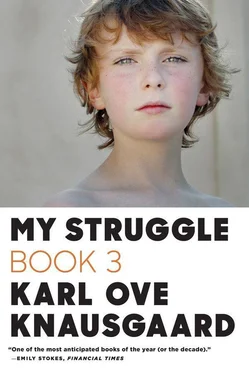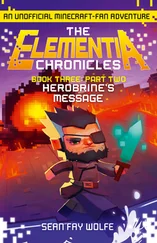I straightened up and glanced at the cement mixer. The round green drum was partially covered by a white tarpaulin and it looked like a headscarf. Her mouth was open, it was big and toothless; what was it she could see that surprised her so much?
Down the hill came Geir Håkon’s father in his green Ford Taunus. I waved; he lifted his hand from the steering wheel in a fleeting response.
I was suddenly reminded of Anne Lisbet. The thought soared from my stomach and spread like an explosion of joy in my chest.
She hadn’t been at school on Friday. Solveig had said she was ill. But today was Monday. She was bound to be better now.
Oh, please let her be better!
I was dying to go up to B-Max and see her.
Her black glittering eyes. Her happy voice.
“Geir! Come on!” I shouted.
I heard his muffled voice from behind the door. The next instant he tore it open.
“Want to take the path?” he said.
“Sure,” I said.
So we ran behind the house, scrambled over the stone wall, and joined the path. From being no more than a mass of tufts with small dried-up channels in between, the bog was now full of water, impossible to cross dry-shod, even in boots, because your foot would sink in a puddle to way above the boot top, but we tried anyway, balancing on the quivering tufts, jumping to the next, slipping, putting out a hand to save ourselves and feeling the ground give, the water seeming to creep up our sweaters under the sleeves of our jackets. We laughed and shouted, telling each other what had happened, crossed the now muddy and slippery soccer field, and went between the deciduous trees to the right, up the broad avenue that might once have been a cart track, it was broader than a path at any rate and covered with a carpet of leaves. Red, yellow, and brown, they lay there, with the occasional splash of green. At the top there was a tiny field, the grass was long here, a yellowish white, and lay flat, plastered to the ground. Above it a bare tor towered, on which there stood an old telegraph pole. The former cart track continued for a while, then disappeared, devoured by the new main road running past, maybe twenty meters from the field. Below lay the forest, mostly oak trees, between two of them there was an abandoned car, in much worse condition than the one where we normally played, perhaps a hundred meters lower down, but no less appealing for that, in fact the contrary: hardly anyone ever played here.
Oh, the smell of an abandoned car in a wet forest! The smell of the synthetic material on the torn seats, moldy and mildewed, but still sharp and fresh compared with the heavy, musty smell of rotting leaves emanating from the ground all around them. The black window seals that had come loose and hung from the roof like tentacles. All the glass that had been smashed to pieces and largely lost in the soil, although there were scattered fragments on the floor mats or in the door openings, like small matte diamonds. And, oh, the black floor mats! Shake them and a whole horde of creepy crawlies ran for cover. Spiders, daddy longlegs, and woodlice. The resistance of the three floor pedals, which you could hardly move. The raindrops that fell through a window onto your face whenever the wind forced them off track or shook them from the leaves of the swaying branches above.
Sometimes we found objects lying around and about near the car: a lot of bottles, some bags of car or porn magazines, empty cigarette packets, empty plastic bottles of windshield fluid, the odd condom, and once we found a pair of underpants still full of shit. We laughed about that for a good long time, about someone shitting themselves and then coming here to throw away their underpants.
But we used to have a shit in the forest when we were on our walks. We would climb up trees and shit from there, squat on top of a cliff and shit over the edge, or on the bank of a stream and shit in it. All to see what happened and how it felt. What color the turds were, whether they were black, green, brown, or light brown, how long and fat they were, and what happened when they lay there glistening on the forest floor, between heather and moss, whether there would be flies swarming around them or beetles climbing over them. Also the smell of shit was sharper, stronger, and more distinct in the forest. Now and then we revisited places where we’d had a shit, to see what had happened to it. Sometimes they had vanished, sometimes there were only dry remains, and at other times they lay flat as though they had melted in a pool.
But now we had to go to school and there was no time for such activities. Down the hill, across the playground, which consisted of little more than a rusty climbing frame, a rusty swing, and a rotting sandpit with next to no sand in it. Up the steep slope, over the high concrete barriers, across the road, and B-Max stood in front of us. The line of satchels in the queue was already long. Some girls were skipping despite the pouring rain; others stood under the overhanging roof in front of the shop. But where was Anne Lisbet? Wasn’t she here?
At that moment the bus came up the hill. Geir and I crossed the road and reached the bus stop as it turned into the tarmac shoulder outside the supermarket. We got on last and sat right at the front. The big windows misted up with the moisture we brought in with us. Many of the kids started drawing in the condensation. The driver closed the doors and set off toward the main road. I knelt on my seat and scanned the back of the bus. She wasn’t there, and it was as if all meaning had leaked from the world. Now I would have to go all day without seeing her and perhaps the following day as well. Solveig wasn’t there either, so it wouldn’t be possible to find out how ill she was or for how long.
Ten minutes later the bus stopped outside the school, we ran across the playground and into the wet-weather shelter, where we huddled with almost all the other pupils until the bell went and we lined up. I knew most of them by appearance now, some also by name and reputation. We had gymnastics with the parallel class, who had an advantage over us, as they came from this area and were on home ground. This was their school, the teachers were their teachers, to them we were just some kind of immigrant, without any rights. But they were also tougher than we were, that is, they had more fights, they caused more trouble and mouthed off more, at least some of them did, which only the toughest of us, viz Asgeir and John, stood up to. The rest of us were pushed around as they pleased. Any second you could feel an arm around your throat, and then a jerk and you were on the floor. Any second a fist could hit you in the shoulder, where it hurt most, as you lined up or were on the way to the classroom. Any second someone could stamp on your toes in a soccer game. But they quickly learned they couldn’t bully John or Asgeir because they retaliated and gave as good as they got. These boys, who lived on the east of the island, also dressed differently from us, at least some of them did. Their clothes were older and seemed more used, as though they only wore hand-me-downs, and not just from one brother but two or maybe even three … Geir’s and my greatest fear was that some of these boys would find us when we were in our secret place. But they didn’t represent much of a problem, you only had to be on your guard when you were out and everything was usually fine. Perhaps the most significant consequence was that we stuck together more and saw ourselves as a unit and the classroom as a bastion of security.
The bell rang, we lined up, and Frøken, tall and thin as ever, appeared at the top of the stairs with her slightly lopsided gait and nervous hand movements, and we marched down to the classroom, where, after hanging up our outdoor clothes on the pegs outside, we at once sat down in our places.
Читать дальше












